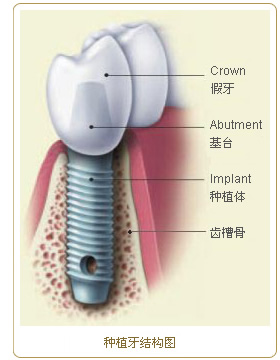1. Introduction 
Dental implants are often considered to be a third set of teeth since they
are extremely similar to our own teeth. Generally, a titanium implant is
embedded into the alveolar bone through a surgical operation at the area of the
missing tooth area. This creates a strong tooth root, which serves as the base
for setting up a new crown on top of it.
Tooth loss can be caused by a variety of conditions, including tooth decay,
periodontitis, developmental disorders, blunt force trauma, etc. Since the
beginning of time, people have been looking for suitable tooth replacements,
originally using such materials as ivory, wood, stone, and shells. Today
however, thanks to the development of advanced technology, modern shanghai dental implants have
become a trusted and important way to restore missing teeth. There are literally
hundreds of implant system in the world now. At iSMILE, we rely exclusively on
the Sweden’s Nobel Biocare, the world’s largest manufacturer of dental implant
systems.
2. Illustration for the dental implant procedure and the introduction of the
dentist
Video
3. Frequently Asked Questions
1) What are the advantages of dental implants?
Generally speaking, there are three ways to restore missing teeth: removable
dentures, a fixed bridge, and dental implants. The advantages of implants
are:
• Attractive. After a tooth falls out, the gum line will shrink since there
is no tooth root to support it any longer. This results in an elderly appearance
regardless of actual age. As compared with removable dentures and a fixed
bridge, dental implants can better solve this problem, restoring a more natural,
attractive appearance.
• Protection of nearby teeth. A traditional fixed bridge typically requires
neighboring teeth to be grinded down to fit and work well together. However,
dental implants totally avoid the need for any grinding.
• Long-term solution. After being embedded, dental implants are stable and
comfortable. Consequently, embarrassing situations, such as a denture suddenly
falling out while eating or speaking, will never happen with implants.
Comparison of dental implants and a fixed bridge.
Video
2) How painful is the operation for installing dental implants? Is it
necessary to be hospitalized?
The surgery for dental implants requires only local anesthetics and
hospitalization is completely unnecessary. Most patients who have received
dental implants have expressed that any pain from the implant operation was less
than from the prior tooth extraction. Some swelling of the gums and a tiny bit
of discomfort may occur. Yet, most implant patients recover very quickly and go
back to work one day later.
3) Will the appearance of the dental implants look natural?
Today’s dental implants are the cutting-edge technology in the field of
modern dental prosthetics. In terms of appearance, comfort and function,
implants usually exceed the expectations of the majority of patients. In fact,
very few people can tell the difference between implants and real teeth.
4) What kinds of patients are unsuitable for dental implant surgery?
The vast majority of people are suitable for implant surgery. Exceptions
include the following:
• While there is no upper limit on age, implants are not suitable for
children and young people whose teeth are still growing and developing.
• Pregnant women should not receive implants during their pregnancy.
• Patients who have received a large number of radiation treatments must
receive the permission of their radiation oncologist before receiving
implants.
• An assessment report issued by specialists is necessary if a patient is
suffering from an immune system disease or systemic bone lesions, taking
antiprothrombin medicine, or suffers from an alcohol addiction.
Note that the service life of dental implants will be decreased for people
who have habits of grinding their teeth, chewing too hard, or smoking.
Nevertheless, there are still many successful examples of such patients.
5) What is the success rate of dental implants?
The medical research and statistical data indicate that the 10-year success
rate is as high as 90% on the maxillary jaw and up to over 95% on the mandible.
However, risks always exist on any operation, and the difficulty level of
operation will be complicated if the patient has certain risk factors, including
smoking, soft tissue inflammation and osteoporosis. In such cases, the result of
the operation may be not as good as expected.
6) What will happen if the implant operation is a failure?
In the rare case of a failure, our professional dental dentist will first figure out
the reason why the failure occurred. Once the reason is known, only then will
the implant be re-embedded. Knowing and understanding what caused the failure is
the key to preventing repeated failures from occurring again in the future.
4. Implant Success Stories
• Front incisor missing
Case A ) Front tooth on T21 fractured, extraction and implant immediately to
fix

Case B ) Molar missing

• Couple teeth missing
Case A

Case B

• Full mouth of missing teeth


